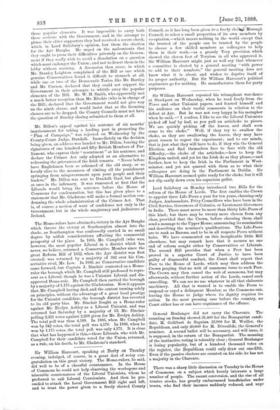Sir William Harcourt, speaking at Derby on Tuesday evening, indulged,
of course, in a great deal of noisy con- gratulation on this great victory. The Home-rulers, he said, did well to be of a cheerful countenance. In the House of Commons he could not help observing the woebegone and miserable countenances of the Liberal Unionists, whom he preferred to call Liberal Coercionists. And then he pro- ceeded to attack the Local Government Bill right and left, and to treat the power given to a freely elected County
Council, as it has long been given to a freely eleCtigi Bbrough Council, to select a small proportion of its own members by co-optation,—which means nothing in the world except that the trusted of the people can be trusted by the people to choose a few skilled members as colleagues to help them in their work,—as a grossly Tory provision which showed the cloven foot of Toryism in all who approved it. Sir William Harcourt might just as well say that whenever a committee is elected by a general meeting "with power to add to their numbers," the general meeting does not know what it is about, and wishes to deprive itself of its proper authority. But Sir William Harcourt's political arguments go for nothing. He manufactures them for party purposes.






































 Previous page
Previous page